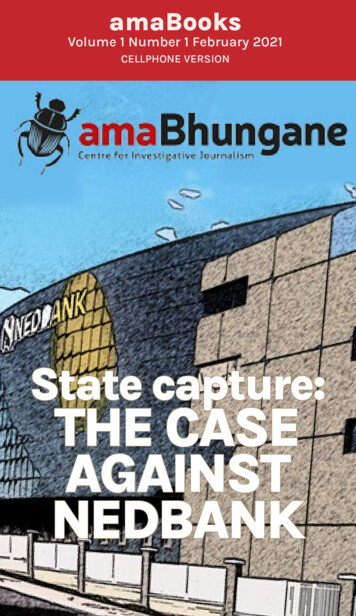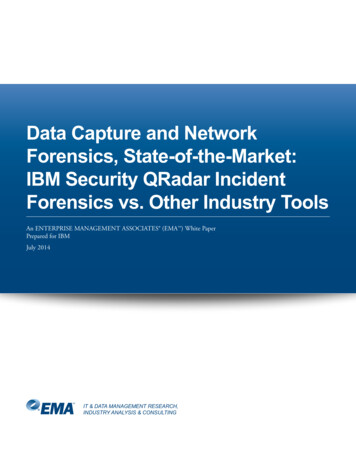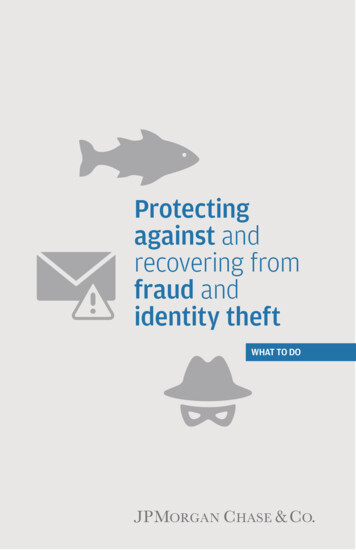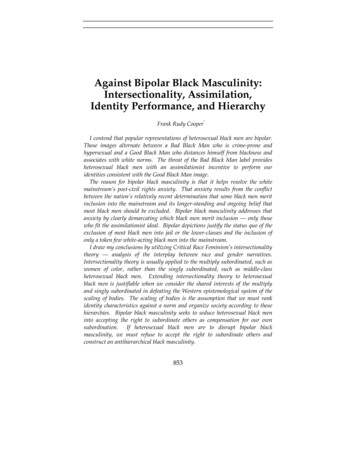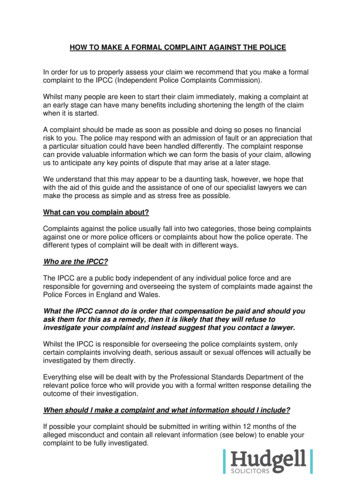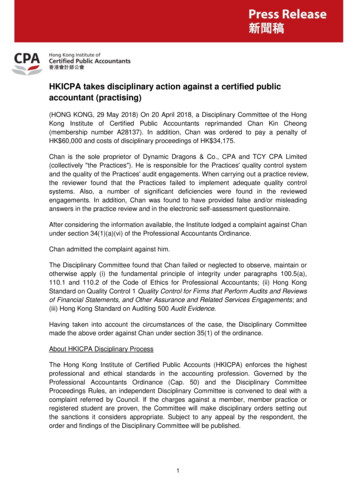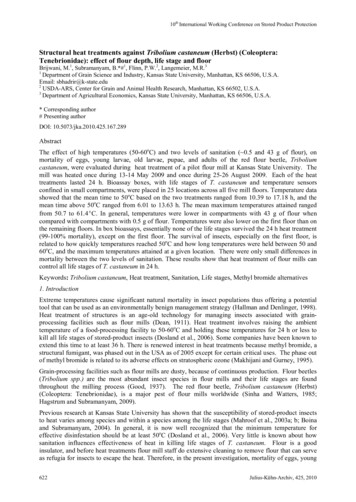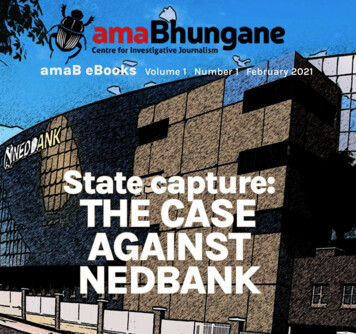
Transcription
S tate C apture : T heamaB eBookscase againstN edbankVolume 1 Number 1 February 2021State capture:The caseagainstNedbank1
S tate C apture : T hecase againstN edbank2Susan Comrie and Sam Sole amaBhunganeStatecapture:The caseagainstNedbankIn the saga of disgraced financial servicesfirm Regiments Capital, one name keepspopping up: Nedbank. After years ofdigging, amaBhungane can disclose that: Nedbank entered a pact with Regiments,rewarding it for pushing the bank’sfinancial products to public sector clientswhom Regiments was supposed to adviseimpartially. Some of these entities lost billions,. YetNedbank agreed to pay Regiments at leastR95-million in commissions, most in theform of ‘introduction fees’ for helping itsecure business from public entities. These commissions – and an additionalR120-million from a similar set of Transnetdeals – were rolled into Nedbank’s charges,at times without the knowledge ofRegiment’s clients.
S tate C apture : T hecase againstN edbankContents4Alarm bells ring in Mathane’s head6In brief: the case against Nedbank10The five page contract at the root of it all13Naked swaps and hidden commissions18The gatekeepers to public sector contracts22The keys that opened the Acsa vault27Financial weapons of mass destruction34 Another R30m from City of Tshwane39 The ‘dream team’ take the helm at Transnet51Nedbank backs away from another swap58 Nedbank responds: Full statement3
S tate C apture : T he1case againstN edbank4Alarm bells ringin Mathane’s headMathane Makgatho was tired. She had spenttwo years being gaslit by senior executivesat Transnet who tried to ram questionabletransactions down her throat. As treasurerof the state rail company, she had stood herground. But here, once again, was Regiments Capital offeringa deal that her years of experience told her was simply implausible.She had reason to be suspicious.A year earlier, Transnet’s chief financial officer, Anoj Singh, had handed her a proposal from Regiments for a R5-billion Nedbank loan andtold her to sign it “today”. But when she read it, alarm bells went off.Instead of a direct loan from Nedbank, the deal was to be channeled
S tate C apture : T heMathane Makgatho . feltdeeply uncomfortablecase againstN edbank5through an intermediary company which would collect interest on behalfof Nedbank, a convoluted arrangement that would cost Transnet R750-million more than was necessary.The proposal was so alarming that she had gone straight to Transnetchief executive Brian Molefe: “I was irate. I explicitly told him that shouldwe approve the structure, we will go to jail for stealing money,” she latertold the Zondo commission.That 2013 deal had disappeared, but Regiments had not. And now, inJuly 2014, she was again being asked to sign off on a Regiments proposalinvolving Nedbank that made her deeply uncomfortable because she feltit was so obviously mispriced.As far as Makgatho could tell, what was fueling the pipeline ofquestionable deals landing on her desk was the rather too closerelationship between Regiments director Eric Wood and Nedbank’s head of credit and international derivatives, Moss Brickman.Makgatho told the commission that she was so appalled byWood and Brickman’s latest gambit that she asked the bankto “lodge a complaint” with Nedbank Capital, thedivision where Brickman worked.“I was not happy [with] what . I thought it wasan improper relationship. Regiments will comewith certain proposals . and at the back ofthose proposals there was always one common bank and that was Nedbank.”Makgatho resigned soon after, in early2015, but she had put her finger on a question amaBhungane had been asking foryears: Why was it always Nedbank?
S tate C apture : T he2case againstN edbank6In brief: the caseagainst NedbankEverywhere we have followed Regiments on its destructive path through state-owned entities and municipalitieswe kept seeing Nedbank offering loans, complex financialproducts called interest rate swaps, and millions of rands inhidden commissions.The case we will outline in the pages that follow is this:For years, Regiments persuaded its clients – public entities who paidand trusted it for independent advice – to take up financial products,often provided by Nedbank. But Regiments’ advice was tainted by thepromise of massive additional fees.If the client agreed to take up loans or interest rate swaps, Regimentsgot millions from the bank; if the client did not, Regiments got only itsstandard advisory fee from the client.This was initially set out in a “highly confidential” commission agreement which saw Nedbank pay millions in “introduction fees” for each
S tate C apture : T hecase againstN edbank7EXPLAINER95 Million (at least) in feesYou mightthink it easyto calculatehow muchNedbank paidto Regiments.It is not. Butthis is whatwe do knowR95.2mR95.5morKeep in mind that R100 paid on Day One isworth a lot more than R100 paid in 2029.R62mThe majority was invoiced underthe Introduction to DerivativeTransactions agreement, wherebyNedbank agreed to pay Regimentsa fee or commission for bringing itnew business opportunities. R120mIn 2013, Nedbank prepared a spreadsheet of 156payments due to Regiments between 2009 and2029, when some of the last interest rate swaps willexpire. The total, seemingly for interest rate swapsand loans, was R95 204 410 (excluding VAT).AmaBhungane has done its own calculationsusing invoices and emails to piece togetherpayments that were made (or promised in future)to Regiments. On some transactions Regimentswas entitled to a larger fee paid in installmentsover many years, but opted to take a smaller feepaid up-front; in these instances we counted thesmaller fee. In total, we got R95 512 192 (includingVAT where applicable).R33mThe rest was invoiced as"services rendered". In theseinstances public sector clientshad allowed Regiments to collecta fee from the bank instead ofpaying Regiments directly.The R95-million excludes the 2015/16 Transnetinterest rate swaps where Nedbank did not payRegiments directly but facilitated the up-frontpayment of R120 635 798 to Regiments. Nedbankclaims it did not know it was passing on these fees.With sometransactions,Regiments sharedthese fees withbusiness partners
CITY OF TSHWANEACSATRANSNETR34.6mR44.8mR120.6mR16.1mCITY OF JOHANNESBURGS tate C apture : T hecase againstN edbank8new deal Regiments brought to the bank. Later, Nedbank agreed toact as postman, delivering millions of rands of public money to thecontroversial firm, with the blessing of Regiments’ public sector clients.By our calculation, Regiments was able to generate at leastR95-million in fees from Nedbank via these two methods, plus another R120-million from a set of Transnet transactions where thefees once again flowed via Nedbank but without, the bank claims, itsknowledge.The additional fees incentivised Regiments to propose deals thatwere not always in the best interests of its clients – state-owned entities and municipalities.Nedbank ignored the obvious conflict of interest because Regiments promised that the fees were always disclosed to its clients,but the evidence shows the Nedbank knew or ought to have knownthis was not true – and that Regiments was abusing its influencewith public officials.Over the years Regiments brought Nedbank deals running intobillions, and the promise of additional fees in turn encouraged Regiments to propose a dizzying array of interest rate swaps. But someof these high-risk transactions proved disastrous for the clients, wholost billions.To understand the scheme – and the troubling partnership betweenRegiments and Nedbank – we need to go back to 2009, and follow atrail that leads through four Regiments clients: The City of Johannesburg, the City of Tshwane, Airports Company South Africa (Acsa) and,In most cases Regiments’ fees are funded by charging the client a higher interestrate on loans and interest rate swaps. So who ultimately pays these fees?
S tate C apture : T heEVIDENCEDOCKETDig into the evidence yourself.Original documents supportingour claims can be found online inour evidence docket. State capture: Evidencedocket — The case againstNedbank Nedbank: Evidence onIntroduction of DerivativeTransactions Nedbank: Evidence onCity of Tshwane restructuring Nedbank: Evidence onCity of Joburg swap Nedbank: Evidence onAcsa [Including evidenceon the City of Joburg andthe City of Tshwane Loans]case againstN edbank9finally, Transnet.In putting together this story we reviewed hundreds of internalemails, numerous confidential reports and affidavits.We sent detailed questions to Regiments’ directors. Two ignoredus; one declined to comment. Regiments previously defended itsactions, saying what it did was “common market practice”.We also conducted two on-the-record interviews with Nedbank in2018. As further evidence emerged, both through our own investigations and via testimony at Zondo, Nedbank became far less forthcoming.When we approached Nedbank again last year, it was no longerwilling to provide information it had previously committed to share.We sent a 35-page letter setting out the evidence we had and theconclusions we were likely to draw, but the bank did not respond indetail, instead saying in a statement:“[W]e have previously met with you with the sole intention of providing you with the correct context and factual scenario and wereopen and honest in responding to your questions.”The proposed article “does not contain anything new besideswhat we believe are unsubstantiated conclusions drawn by you.“Nedbank has at no time acted unlawfully, or improperly in itsdealings with Regiments and the affected counterparties. Nedbankdenies any inference or accusation that Nedbank was complicit inany alleged scheme by Regiments to defraud its clients.Nedbank also rejects any suggestion that it ignoredRead’red flags’ relating to the conduct of Regiments.”Nedbank’sHere is the evidence which, in our view, says othfullerwise.statement
S tate C apture : T he3case againstN edbank10The five page contractat the root of it allThe contract was barely five pages long. Signed in May2009, and dubbed Introduction of Derivative Transactions,it promised Regiments a fee for bringing new business toNedbank.The existence of this contract remained a secret for seven years, until 2016 when lawyers for one of Regiments’ clients uncovered millions in undisclosed fees.In an emailed response, Regiments director Niven Pillay showed thelawyers this “highly confidential” document but warned the contractshould not to be shared with anyone “without our express permission”.“Regiments Advisory [has] been referring business and earning itsfees from the banks”, Pillay wrote, assuring the lawyers that this wasa “common market practice”.And although the phrase “introduction fee” was changed to “fee” in
S tate C apture : T he A close studyof the ‘trackchanges’ showsthat Eric Woodtried to deletethe clause thatsaid Regimentshad to tell itsclients that itwas getting asweetener fromthe bank case againstN edbank11the final version of the contract, the principle remained the same: ifRegiments brought Nedbank new business, it would get a cut.Introduction fees are not uncommon but they are a rich vein forcorruption.As a result, the Financial Advisory and Intermediary Services Actand its code of conduct are clear that an advisor like Regiments hasto disclose “any incentive . commission, fee” it is getting on the side.This is not idle legalese, but a very real protection for clients, whoneed to know that their interests and not those of third parties arebeing served.AmaBhungane was able to access a batch of correspondence between Regiments and Nedbank, including drafts of the Introduction ofDerivative Transactions agreement. A close study of the “track changes”shows that Regiments director Eric Wood tried to delete the clausethat said Regiments had to tell its clients that it was getting a sweetener from the bank.The clause was reinserted into the agreement after Brickman,Wood’s contact at the bank, reported that Nedbank’s compliance department “is adamant that a clause relating to the disclosure to theclient be included”.This episode should have set off alarm bells at Nedbank. Regiments’ clients were almost always in the public sector and generallyRegiments had been hired (and paid a fee) by them to advise themon complex financial transactions. If Regiments was being offered anextra fee on the side, those public sector clients had a right to know.When we interviewed Nedbank in 2018, Anél Bosman, then managing executive of corporate and investment banking, tried to downplayRegiments’ reluctance to include a disclosure clause: “[W]hetherthat clause was included or not was an additional measure that the
S tate C apture : T hecase againstN edbank12bank took because we wanted the right to ask for it for our own records.But Regiments at all times, being regulated by the [Financial ServicesBoard], had that responsibility in any way.”The final agreement, signed in May 2009, confirmed that “Regimentsundertakes to disclose to the Client” that Regiments would receive a feefrom Nedbank and added that “Regiments will provide Nedbank Capitalwith written proof of such disclosure when requested.”In a number of cases, the only written "proof" Regiments provided wasa one-line disclaimer added at the bottom of its invoices to Nedbank:“Regiments Capital (Pty) Ltd has informed its client that it is earning afee for the facilitation of the above transaction.”But had it?Absa asks for full disclosureRegiments wasted no time. As soon as itreceived a copy of Introduction of Derivative Transactions from Nedbank, it copiedit across onto a Regiments letterhead, deleting afew clauses along the way, including the disclosure clause.Then Regiments sent a copy to Absa, which hadalso been approached to quote on an interest rateswap at Acsa.Absa agreed to enter into the introduction feeagreement with Regiments, but added a clausesaying that Absa would write a letter to the client‘wherein ABSA Capital will disclose that a fee hasbeen paid to Regiments’.In other words, Absa would not leave it up toRegiments to disclose the fee.Absa was unwilling to go into detail about thecontract but told us: ‘This is a standard introducer agreement, in terms of which we disclose thefees.’ (Emphasis added.)It appears that this did not suit Regiments, andas far as both we and Absa can tell, Absa did notreceive any derivatives business from Regimentsafter their agreement was signed.
S tate C apture : T he4case againstN edbank13Naked swaps andhidden commissionsOne of the first deals that Regiments brought to Nedbankunder the Introduction of Derivative Transactions agreementwas an interest rate swap with one of Regiments’ mostloyal clients: the City of Johannesburg.In 2009 the city found itself in trouble. It had enteredinto a series of interest rate swaps to balance out the risk of variousloans. But the loans had been paid off early leaving the city holding “naked” swaps, a speculative position that did not sit well with the auditorgeneral, who instructed the city to get the swaps off its books.There were several ways the city could do this: the simplest was to unwind the swaps with Standard Bank and RMB, the counterparties whosat on the other side of the swaps.Instead, Regiments’ Wood and Pillay proposed the city enter into aconvoluted, two-step transaction: the city would cede the swaps to itssinking fund which would then pay Nedbank to take over the swaps. The
S tate C apture : T heEXPLAINERcase againstN edbank14Interest rate swapsAn interest rate swap is an agreement between two partiesto exchange the interest rates they pay on loans.PAYS: FLOATINGPAYS: FIXEDbut hates riskPARTY AParty A has a loan with afloating interest rate, which isunpredictable and risky. It wantsto pay a fixed rate, which willcost more but make its debtrepayments more predictable.but wants to gamblePARTY BParty B has a loan with a fixedinterest rate. It has moreappetite for risk and is willingto gamble that interest rateswill drop.PARTY APARTY BNOW PAYSNOW PAYSFIXEDFLOATINGINTEREST RATESThe solution: Party A and Party B agree to swap interest ratesPARTYPARTYPARTYPARTYAABIf interest rates INCREASE then Party A is in the money and Party B has to pay.But if interest rates DECREASE then Party B is in the money and Party A has to pay.B
S tate C apture : T he Mathamelaapproved theproposal onhis last day inoffice. He wouldresurface a fewmonths lateras Regiments’business partner case againstN edbank15sinking fund (a pool of money set aside for paying long-term debts)was conveniently managed by a subsidiary of Regiments.The transaction would cost R12-million, the two Regiments directors told city treasurer William Mathamela. The city would have topay Nedbank R11-million to take over the swaps, which they assuredhim was the going market rate, plus modest costs of R1-million.Mathamela approved the proposal on his last day in office. Hewould resurface a few months later as Regiments’ business partner,but in a written response denied that this played any part in approving the transaction.But, unbeknown to the city, Regiments had struck a backroomdeal with Nedbank.The details are spelled out in emails between Wood, Brickmanand another Nedbank employee, Mario Visnenza: The bankwould take over the swaps and be paid the going “mid-market” rate of R5.2-million; it would take another R750 000 to cover itscosts and R2-million as profit.These costs would be deducted from the R12-million that the cityhad blindly agreed to pay; what was left – more than R4-million –Nedbank would pay Regiments as “fee” for bringing it the business.Technically, there were two divisions of Regiments involvedin this scheme: Regiments Capital was advising the city onReadhow to manage the swaps while a subsidiary, RegimentsMathamela’s Fund Managers, offered the dubious solution. But both werefull response represented by Wood. And Wood (the advisor) was not aboutto tell the city that Wood (the fund manager) was lying aboutthe cost of the transaction.Yet, when Regiments delivered its invoice to Nedbank – issued
S tate C apture : T hecase againstN edbank16under the Introduction of Derivative Transactions agreement – it confirmed that “Regiments Capital (Pty) Ltd has informed its client thatit is earning a fee for the facilitation of the above transaction”.That seems unlikely.Emails show that both city officials and KPMG, which had beenappointed by the auditor general, asked Regiments for a breakdownof the R12-million, including “all documentation/justification thatyou may have received from Nedbank for the costs relating to theunwinding of the COJ swaps”. But Regiments failed to mention thatmore than R4-million of that figure would go to pay its commission.A city spokesperson told us: “The City was at no point made awareby Regiments and/or Nedbank of the ‘Introduction of DerivativeTransactions’ . and of the fees paid to Regiments.”KPMG shrugs it offKPMG was appointed by the auditor general to conduct a high-level review of thecity’s Regiments-managed sinking fund.KPMG’s draft report shows that both it and thecity independently reached the conclusion thatthe mid-market rate should have been just underR5-million, in other words roughly what Nedbankactually charged.But with no insight into the back-room deal,KPMG shrugged and concluded that the transac-tion was done at fair value. The R12-million fee thecity paid was probably ‘reasonable’, KPMG wrote inthe draft report, because it had been agreed uponbetween ‘two knowledgeable, willing parties in anarm’s length transaction’.KPMG would not say whether it stands by theconclusions in its draft report, but stressed itwas ‘not involved in nor aware of any collusion orsignificant commission payments made to Regiments’.
S tate C apture : T heNedbank Corporate andInvestment Bank headBrian Kennedycase againstN edbank17Nedbank, of course, knew t
State Capture: the CaSe againSt nedbank 3 4 Alarm bells ring in Mathane’s head 6 In brief: the case against Nedbank 10 The five page contract at the root of it all 13 Naked swaps and hidden commissions 18 The gatekeepers to public sector contracts 22 The keys that opened the Acsa vault 27 Financial weapons
